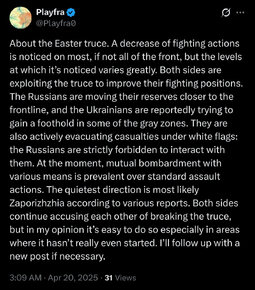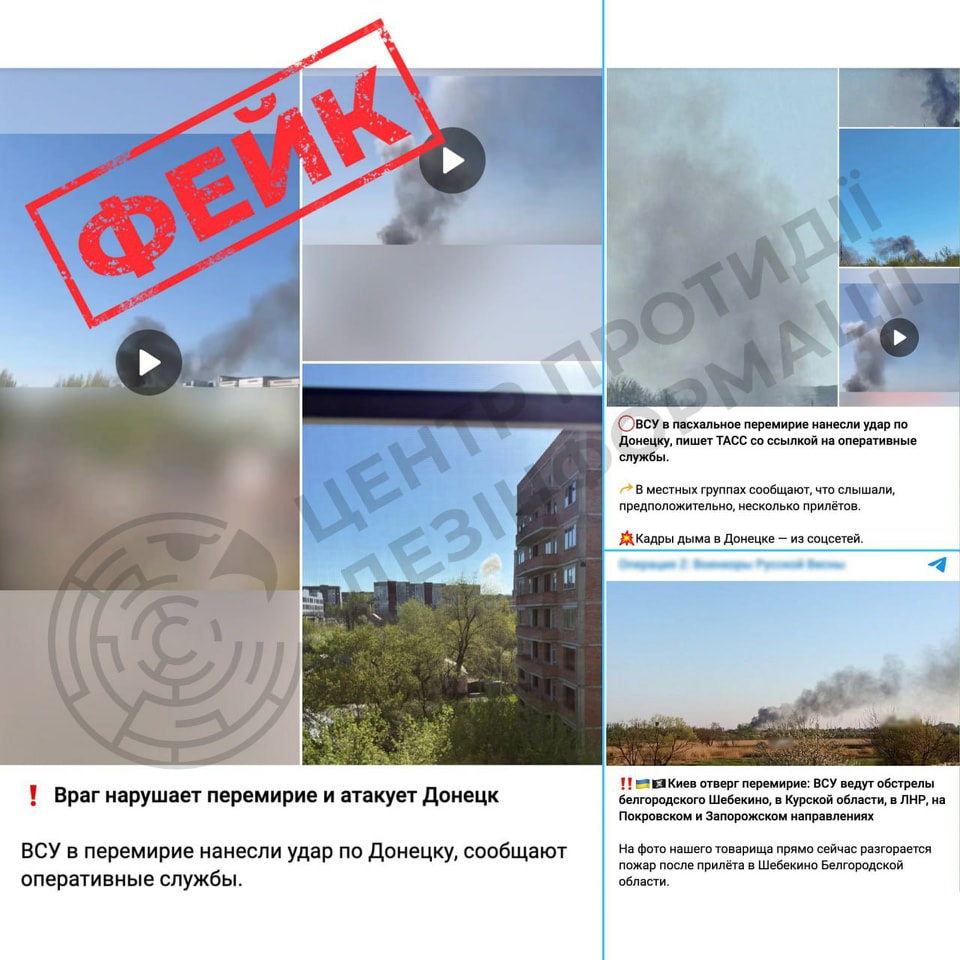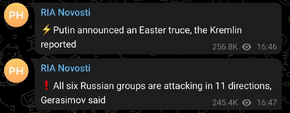KipPotapych
Well-Known Member
Druzhba pipeline operates today as it was (with interruptions caused by the Ukrainian strikes). There are no other oil pipelines connecting Russia and Europe. Most of the oil to Europe (or elsewhere) was always shipped via sea. I’d check your sources.With the inability to export oil through European pipelines, Russia is forced to use tankers.
It’s just supply and demand.But they may be rejoicing that cost for others are increasing, while increasing costs for themselves is seen as the price to pay for victory.
It does somewhat imply though that western companies may have sold not only “rust-buckets” to Russia for their “shadow fleet”.
I don’t disagree with that, generally. However, that can also be argued. The gap here is between active participation and full on involvement, to use your wording. The strike doesn’t happen simply because the calculations are not there. In other words, while the United States feels they can have Ukrainians pushing buttons to strike “points of interest” on the (actual) Russian territory, Russia feels it cannot strike the rec centre in Germany hosting Cavoli and other top rank. Put yet otherwise, the general perception of the degree of involvement here is dictated by one side because the other side thinks that an appropriate response (which really is an Oreshnik strike somewhere in Europe) would be detrimental to its own wellbeing; in other circumstances, for example, a much lower degree of involvement could cause the involved state to stop functioning or disappear entirely. The strong will do what the weak will tolerate. Consequently, the perception of the degree of involvement is also accepted by the other side and its lack of response (sabotage, aka actual proxy war, aside). Perhaps, an illustration of a nuclear deterrent failing, while a conventional deterrent being intact.The term participation is nice and vague and the idea of sitting in the gap between neutrality and active participation is nothing new, just look at Soviet military advisers in Africa. Or US military advisers in Vietnam. As it stands it seems to me that the US is involved as a patron through a proxy rather than directly. I think it's meaningful to distinguish advisers, support, planning, logistics, and even the occasional black op, from a full on involvement. Russia certainly does. Russia hasn't fired Oreshnik missiles at US facilities in Europe that are supporting Ukraine.
At the end of the day, the United States hasn’t been in war for many decades, since the war with Japan, some argue.
Russia hit a gathering of Ukrainian military personnel in Sumy, at a local state university. Reportedly it was an awards ceremony for the 117th TerDef Bde. Significant collateral damage is reported. We also have at least one pickup with a Ukrainian army tactical marking on it lending credence to the reports.
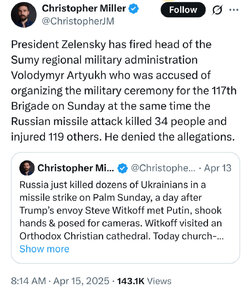
A take on the new accusations by Ukraine regarding Chinese supply of artillery to Russia and manufacturing of weapons on the Russian territory:
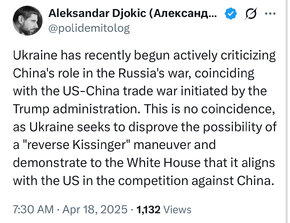
I think it misses the point because a) Ukraine is not a player here and b) the US doesn’t care about Ukraine (related to a)) and even sees it as an obstacle to their current interests.
Rubio suggests that the US may abandon Ukraine
The United States will walk away from efforts to broker a Russia-Ukraine peace deal unless there are clear signs of progress soon, U.S. President Donald Trump and Secretary of State Marco Rubio said on Friday.
"Quickly, we want to get it done," Trump told reporters at the White House. "Now if for some reason one of the two parties makes it very difficult, we're just going to say, 'you're foolish, you're fools, you're horrible people, and we're going to just take a pass. But hopefully we won't have to do that."
Trump's comments followed remarks by Rubio, his top diplomat, who said the sides had just days to show progress or Washington would walk.
"We're not going to continue with this endeavour for weeks and months on end. So we need to determine very quickly now, and I'm talking about a matter of days, whether or not this is doable in the next few weeks," Rubio said in Paris after meeting European and Ukrainian leaders.
"If it's not possible, if we're so far apart that this is not going to happen, then I think the president is probably at a point where he's going to say, 'well, we're done'."
Also relevant to the context:
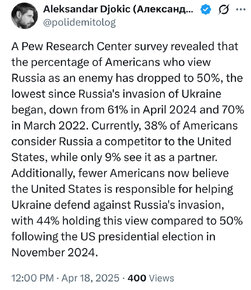
A good discussion of the war in Ukraine in light of the NYT article discussed a few days/weeks ago (The Secret History of the War in Ukraine). The discussion took place at the Munk School of Global Affairs (Toronto, Canada). Definitely worth your time, in my opinion.
The US and Ukraine signed a “memorandum of intent” on the mineral deal (lol). Understandably, Ukraine is stretching it to as long as possible, making sure the military assistance (approved by the Biden administration) keeps dripping. I wonder what is going to happen next though, after the US stops that assistance, intel sharing, etc.
While Bessent says the deal will be signed by April 26, the Ukrainians say that there is further discussion to take place and signing “shortly after”. Both sides are playing the current administration for the fools they are. There are also contradicting reports from the two sides regarding the deal itself: Americans say that the deal is largely the same as it was before, while Ukrainians insist that they negotiated better terms. I guess the two are not mutually exclusive since the “better terms” could be rather marginal, but the second variation of the deal previously reported was definitely worse (for Ukraine) than the first. I guess we will see. My guess is nothing will happen, especially if Rubio is right and Ukraine will be abandoned before April 26.
Bessent later clarified, however, that details were still being finalised, with the aim of signing by April 26, next Saturday.
He added the deal was substantially the same as one previously negotiated, where Zelenskyy and Trump had not signed a memorandum of understanding. Ukrainian officials, however, said they have managed to bring the agreement more in line with their preferences.
Ukrainian officials familiar with the matter said the sides were expected only to report progress by April 26, after Prime Minister Denys Shmyhal’s visit to Washington, with the goal of concluding discussions and signing shortly thereafter.
Source (paywall):



